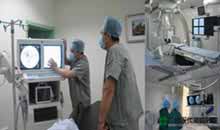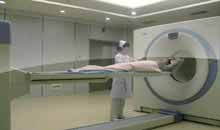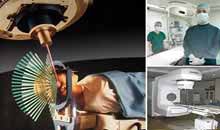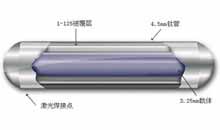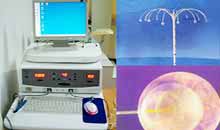- Basic
- Symptoms
- Diagnosis
- Treatments
What is Adrenal Cancer?
Adrenal cancer is a malignancy starts in adrenal gland, which can mainly divide to adrenocortical cancer, adrenocortical tumor, etc. As an important endocrine organ, adrenal gland is just next to kidney. Though it is small, the tumor develops from it is quite different in size. Normally a tumor in adrenal gland with a diameter less than 3cm is a small tumor and the smallest one can be less than 1 cm and a bigger one can reach 10-30 cm. the shape of adrenal tumor is various, it can get a shape like bean, peach, plum, apple, Hami melon, etc. The incidence of adrenal cancer is high and keeps increasing year by year. Meanwhile, when a case develops to late stage, the treatment will be more difficult to perform.
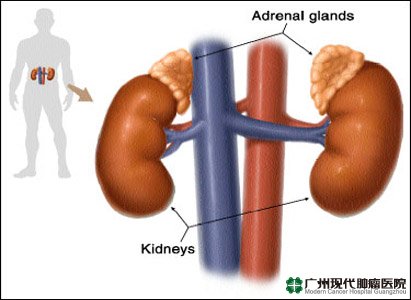
Types of Adrenal Cancer
Adrenocortical cancer as a malignancy develops in adrenal cortex is rare to see. It not only destroys normal adrenal tissues, but also encroaches on adipose tissue around, as well as the kidney on the same side.
Adenoma adrenal medullary is a kind of tumor starts from adrenal medulla, sympathetic ganglion or other chromaffin tissues. Its original cell is sympathetic neuroblast which can differentiate to ganglion cell and chromaffin cell, and from neuroblastoma, paraganglioma and pheochromocytoma.
Causes of Adrenal Cancer
Currently the cause of adrenal cancer is still unclear. But it thought to be related to the risk factors below:
1. Adrenal tuberculosis. Chronic hypoadrenia, which develops after treatment for adrenal tuberculosis, would cause adrenal cancer.
2. Auto-immunologic derangement. Atrophy of adrenal cortex, arising from sudden autoimmune disorder is thought to be the most common cause of adrenal cancer.
3. Metastases from other malignancies to adrenal gland takes up to 26%-50% of all adrenal cancer. For example, gastrointestinal cancer, lung cancer, breast cancer, thyroid cancer, melanoma.
Nursing Methods of Adrenal Cancer
1. A patient should keep a positive mind and be confident to come over the disease.
2. Have a good rest. A patient shall avoid strenuous physical activities and injures of abdomen. When renomegaly presents obvious, it is better for a patient to wear supporter instead of waist belt to avoid cyst rupture. Generally a patient should have follow-up every 6 months and family should take ultrasound B examination.
3. Diets of patient. A patient should avoid the diets are too salty (including preserved food), spicy and irritating (like pepper, alcohol, shrimp, crab, etc.), or are polluted (such as rotten, leftover) and roasted. For the patients also are suffering renal inadequacy and uremia should keep away from beans and bean products, while the intake of zoogenic protenum, greasy good shall be limited.
4. Positively prevent from infection.
5. In order to avoid renal inadequacy occur, the blood pressure of a patient should be under control.
Above mentioned are daily nursing methods of adrenal cancer. Good daily nursing care can make the treatment for adrenal cancer patients easier and faster.
The minimally invasive and target treatment system from Modern Cancer Hospital Guangzhou is possessing cryotherapy, radiofrequency ablation, interventional embolism, radioactive particle implantation, immunotherapy and other treatment technologies, of whose advance is internationally and generally accepted. The new treatment mode of minimally invasive and target therapy with the combination of TCM and western medicine, created by Modern Cancer Hospital Guangzhou, featuring small trauma, fast recovery after treatment, precise positioning and treatment. As this treatment mode can directionally and locally kill tumor without hurting normal tissues and organs around. Comparing to general treatments, it avoids the shortages like damaging patient immunity in traditional radiotherapy and chemotherapy. Additionally, it avoids excessive treatments unnecessary and relieves the pain of a patient, while it prolongs the life span and improves the living quality and long-term therapeutic efficacy too.
Fast pace of work and life, unhealthy dietary habit and heavy psychological pressure, all these factors bring more and more people into hypertension problems. However, there are such a group of hypertension patients, whose blood pressure stay high even taking medicines under instruction of a physician. Why? In fact, persistent hypertension and adrenal cancer have close relationship, which patients should not neglect. Besides hypertension, what are the other symptoms of adrenal cancer?
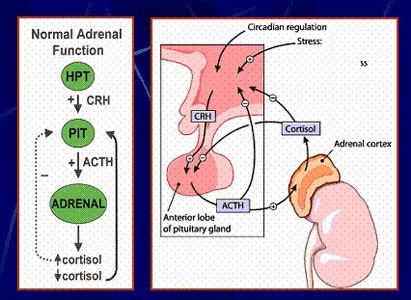
Adrenal cancer is malignant cancer that originates in the adrenal gland. It is divided into adrenocortical carcinoma and adrenal medulla tumors, etc. Cancer can happen in adrenal cortex and medulla. Cancers that can cause endocrine function variation are known as functional tumor, while those can not cause endocrine function changes are known as nonfunctional tumors.
Adrenal cancer symptoms
Most adrenocortical carcinomas are functional. They usually appear with virilization of female, hypercorticism, and are prone to local infiltration and metastasis. Generally, if metastasis through lymph nodes and blood vessels happens, the average survival time will be 2 years.
Adrenocortical carcinomas usually have bigger sizes, which are often above 100 g. Some can reach more than 1000 g. They aggressively grow, have blur boundary, with brown yellow or multi-color section, soft nature, and often cause bleeding, necrosis, as well as cystis degeneration.
Adrenal cortex hyperplasia or tumor can also cause hypercortisolism, which can cause many symptoms, such as moon face, buffalo bump, central obesity, thin limbs, plethora and purple striae; tiredness, failure, low back pain, hypertension; hairy, hair loss, acne; sexual dysfunction, amenorrhoea or menstrual decrease.
Cortical tumors can cause gonad anomaly syndrome, which is divided into enlargement and pubertas praecox of reproductive organs, pseudarrhenia and virilization of female. 80% - 90% pheochromocytomas originate in adrenal medulla, mainly with symptoms like hypertension, metabolic changes, paroxysmal hypertension, palpitations, shortness of breath, headache, sweating, mental stress, coolness of extremities and thrilling.
Modern Cancer Hospital Guangzhou remind that, once above signs occur, one should go to regular hospital for examination timely and do not neglect even tiny symptoms that occur.
There are many kinds of adrenal cancer diagnosis methods. Only with proper examination methods chosen according to different symptoms of patients, can we accurately check out the condition and get accurate diagnosis results, which are of great help to treatment.

Radiation imaging
1. CT examination: Further diagnosis of adrenal cancer. Factors that affect CT diagnosis of adrenal cancer include the size of tumor, whether the perirenal fat is rich or not, and whether the density of mass is close to the nearby fat, etc.
(1) Adrenocortical carcinoma: rare, mostly happens to women between 30 to 60 years old. CT performance: lobulated tumor with diameter less than 5 cm, irregular outline; vague edge, adhered with surrounding organs; equidensity or low density, especially low in central necrosis liquefaction; A few patients have scattered high density calcified shade around the lesion or in its center; possible metastasis in nearby tissues.
(2) Metastatic adrenal cancer: the most common primary cancer is lung cancer and breast cancer, followed by cancer of stomach, colon, and pancreas, etc., which often have no symptom. CT performance: bilateral or unilateral mass shades with different sizes, irregular mass shape, uneven density, and are prone to cystic changes or bleeding. It is often detected by accidental CT examination for other reasons. Once the primary cancer is detected, diagnosis can be confirmed.
(3) Adrenal neuroblastoma: rare, more than half of which happens in adrenal medulla, high degree malignant. CT performance: irregular solid tumor mass, CT value is lower than that of muscle tissues. When complications like tumor necrosis, cystic change and bleeding happen, the density will be uneven. The tumor often has envelope. The larger tumors can grow across the center line and easily pierce the envelope and invade the surrounding tissues.
2. MRI examination: it is beneficial to the adrenal pheochromocytoma inspection and differential diagnosis. MRI can provide the histological characteristics that CT cannot.
Ultrasonic imaging
B-ultrasound examination: the first choice for the adrenal tumor screening.
Laboratory examination
Adrenal function tests may include: plasma epinephrine and norepinephrine; urine catecholamines, plasma aldosterone; plasma cortisol, etc.
Modern Cancer Hospital Guangzhou reminds that, regular examination in regular hospital is helpful for early detection and timely treatment, which can help effectively control adrenal cancer.
The adrenal gland is located above the kidneys, and just like kidney, also has 2 glands: the right one and the left one. The left adrenal gland looks like half-moon and is adjacent to spleen; right adrenal gland is in triangular and adjacent to the liver. The adrenal gland is very important, but it is not a urogenital organ, but an endocrine organ. It can secrete four categories and dozens of kinds of hormones which would be delivered to body’s tissues and organs through blood circulation and exert physiological effects. Due to adrenal’s hidden location, it is difficult to treat. The traditional methods for adrenal cancer mainly are surgery, radiotherapy, chemotherapy and traditional Chinese medicine treatment. With the development of science and technology, minimally invasive treatment has become the preferred tumor therapy which has been accepted by more and more patients.

1、 Surgery
Adrenal cortical cancer takes operation resection as the main treatment method. If without distant metastasis, resection on primary tumor as well as on adjacent lymph nodes shall exert good effect, and then perform pathological examination one by one. If with distant metastases, the primary tumor with metastatic tumors as much as possible should also be resected, as this can improve the effects of drug therapy or local radiotherapy.
2、 Radiotherapy
As primary adrenal lymphoma and metastatic adrenal cancer are sensitive to radiotherapy, therefore both the stereotactic radiotherapy and conformal radiotherapy can be adopted for them.
3、 Chemotherapy
Although chemotherapy can treat cancer cells, it still kills other normal cells or immune cells, bringing side effects to patients. At present the clinical has launched local chemotherapy which combines with patient's condition to conduct interventional regional perfusion of chemotherapy. According to clinical manifestations of Modern Cancer Hospital Guangzhou, treatment is guaranteed, at the same time, patient’s discomforts have been alleviated greatly.
4、 Minimally invasive treatment
For these tumors that operation cannot remove, or recur& spread after operation, minimally invasive treatment shall be adopted.
(1) Argon-helium knife: it performs cryotherapy treatments under the guidance of the ultrasound or CT to kill tumor cells with only small damage to the surrounding normal tissue, so this method is a relatively safe one;
(2) Radio-frequency ablation: insert electrode needle into the tumor; through a high frequency current, the electrode needle core-surrounded tissues would generate high temperature due to the high speed ion vibration and friction, which result in tissue protein coagulation, necrosis, thereby inactivate tumor cells;
(3) Radioactive seed implantation: implant radioactive 125I particles into the tumor, as 125I particles can emit continuous gamma rays in short distances to kill tumor cells, so that achieve the function of internal radiation therapy for the tumor.
5、Chinese medicines treatment
The treatment is conducted through oral take or injection; Chinese medicines not only can kill cancer cells and destroy tumor, but also adjust the balance of yin and Yang and strengthen body resistance, in the end eliminate survival environment of cancer cells and achieve the therapeutic effect.
Modern Cancer Hospital Guangzhou reminds that adrenal cancer is a kind of complex disease, and its pathological injury caused by malignant tumor has the character of diversity. Single application of a technique in the treatment of adrenal cancer can hardly obtain good therapeutic effect; only combined applications of a variety of technologies to complement each other, maximum efficacy shall be realized.
If you have any questions, please contact us via online consultation, email or phone call. If you find our website useful, please follow our FaceBook and YouTube, health information will be updated regularly.










